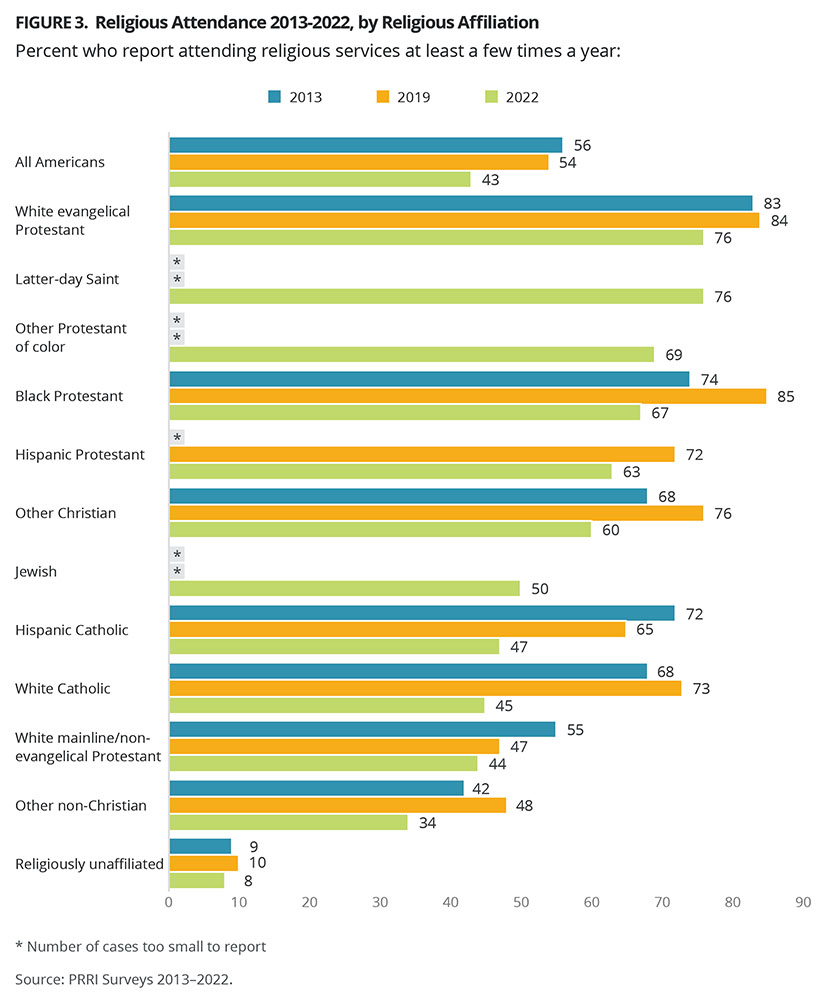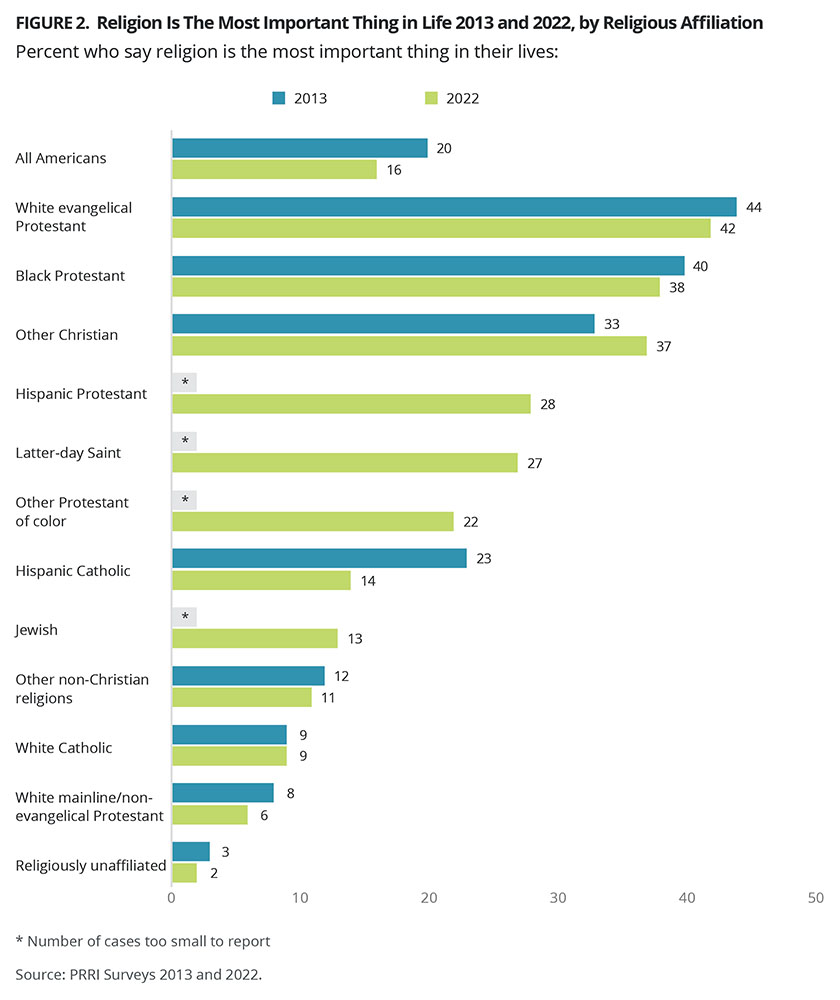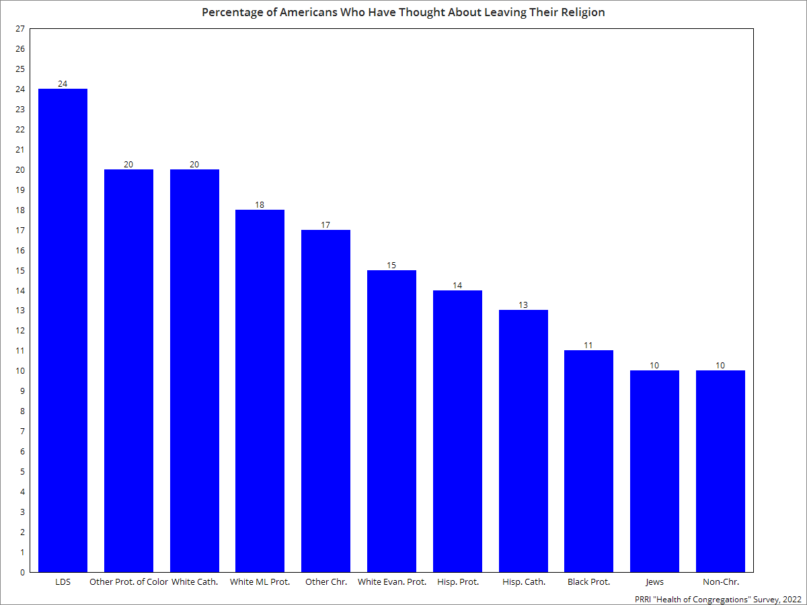(RNS) — Members of the Church of Jesus Christ of Latter-day Saints rank the highest of all Americans in religiosity, worship attendance and other measures, according to the Public Religion Research Institute’s latest report about religion in American life. Yet the results are mixed, with Mormons’ responses to the survey showing a weakening of religiosity in some other areas.
PRRI’s survey, conducted in August of 2022, canvassed a sample of 5,872 American adults, of whom 94 identified as LDS (1.6% of the total sample). While the margin of error is high with any small subgroup, the results are thought provoking.
First, in what many U.S. Latter-day Saints will view as good news, they ranked or tied for first in having the highest percentage of any religion of people who pray, attend church at least a few times a year and visit with their religious leader.

“Religious Attendance 2013-2022, by Religious Affiliation” Graphic courtesy PRRI.
These findings are in line with previous surveys by PRRI, Pew and others that show Mormons having very strong rates of personal piety.
“What strikes me is that we still see a picture of Latter-day Saints who are more religious than the U.S. population, and there are still indicators that that is the case,” said Melissa Deckman, CEO of PRRI and a longtime political scientist.
“We always report religious attendance, but in this area of specific practices, like praying and talking to religious leaders, clearly Latter-day Saints stand apart on that measure.”
On the other hand, the survey had at least two indications of what might be seen as a flagging sense of devotion.
The first was that Mormons ranked only in the middle of the pack in the percentage who ranked religion as the “most important” thing in their lives. Just 27% of U.S. Latter-day Saints chose that option, trailing white evangelical Protestants (42%), Black Protestants (38%), “other Christian” groups (37%) and Hispanic Protestants (28%).

“Religion is the Most Important Thing in Life 2013 and 2022, by Religious Affiliation” Graphic courtesy PRRI.
But when you add that together with the second possible response — “Religion is one among many important things in my life” — Mormons rank highly, because 52% chose that option.
“If you were to combine those things together, you’re looking at 79%, or [more than] three in four. But we had asked the question that way a decade ago, so we had to keep the wording consistent,” Deckman said.
The 2022 PRRI data on Mormons’ answers to this question does not have a longitudinal comparison, because when it was asked in 2013, there were not enough Latter-day Saints in the survey to break them out as a separate religious group.
However, the Cooperative Election study, a national online survey conducted in the wake of major elections, has asked a similar question annually since 2008 and shows a decline in the percentage of Mormons who said religion was “very important” to them — the 76% who agreed with that statement in 2008 had dipped to 61.7% by 2020. So PRRI’s finding is not an isolated one.
The second possible sign of declining fervor was that 24% of American Mormons surveyed answered yes to the question, “Has there ever been a time when you thought about leaving your current religious tradition or denomination?”
This was the highest of any religious group, a major surprise. The next-highest were “other Protestants of color” and White Catholics, at 20% each. Only 10% of Jews and members of non-Christian religions (e.g., Hinduism, Islam, Buddhism) said they had considered defecting.

Latter-day Saints ranked first among members of different faiths who had thought about leaving their religion, at 24%. Data courtesy of PRRI’s 2022 Health of Congregations survey.
“I would suspect that Latter-day Saints are not immune to some of the other forces of secularization,” said Deckman of the unexpected finding. “I think that overall, we found what sociologists call ‘religious churning’ in American society. A growing number of Americans have changed their religious tradition, and it has caught up to some extent with Latter-day Saints.”
In addition to widespread secularization being an underlying reason, another possible explanation is demographic. Mormons, said Deckman, tend to be younger than other religious groups, “and disaffiliation among GenZ is much higher than among the general population. So I would not be at all surprised if age is a factor.”
Related content:
For US Mormons, religiosity has declined over time, study shows
Is Mormonism still growing? Five facts about Latter-day Saint growth and decline
Poll: Religious attendance is shrinking but those who remain are happy





